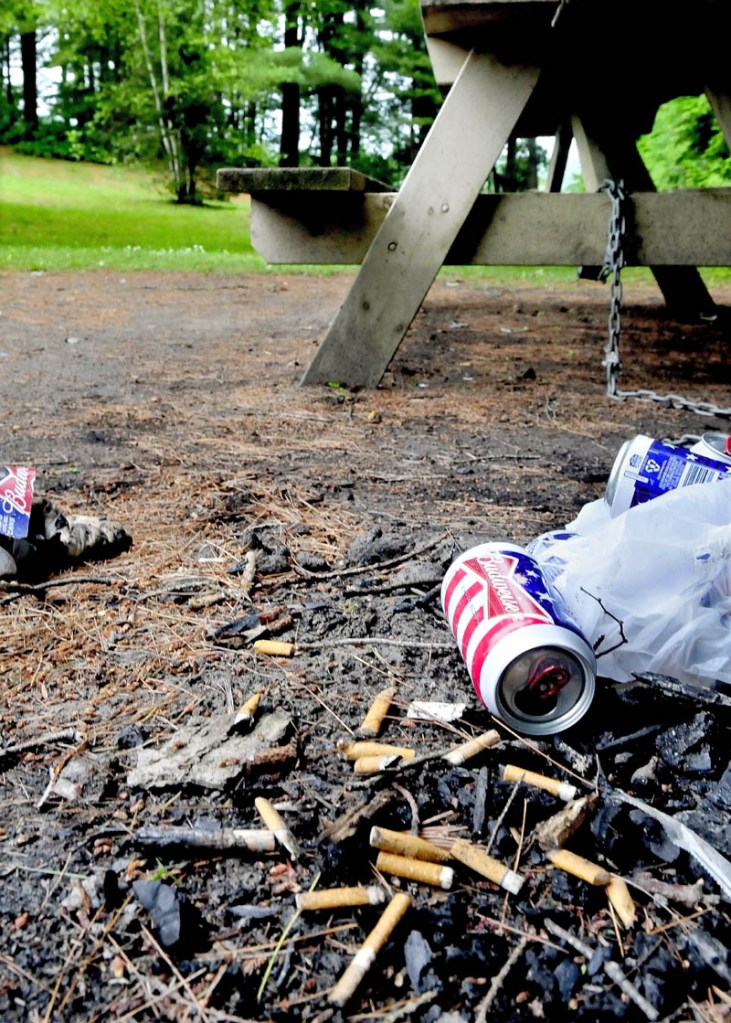OAKLAND — The Town Council is considering an outdoor smoking ban for the town’s parks and beach, the latest in a wave of regulations that have taken Maine’s smoking debate outdoors.
Tobacco use continues to cause political and financial forces to clash in Maine, which once had the highest rate of underage smokers in the country, but which recently received an “A” grade from the American Lung Association for its state smoking restrictions.
In Oakland, Town Manager Peter Nielsen is drafting an amendment to the town’s control of public areas ordinance after council members said they would like to at least consider the move.
The ordinance would build on a 2004 resolution in which the council recommended, but did not mandate, that people refrain from smoking at outdoor town-owned areas.
The council will now consider whether to add the smoking ban to its Control of Public Areas ordinance, a law that can be enforced by police and which includes fines between $50 and $75.
Outdoor smoking bans were unheard of 20 years ago, but have become routine. Waterville, Skowhegan and Augusta all have restrictions on smoking in public places. Monday, the University of Maine at Augusta joined other university system campuses in becoming smoke-free and the Dorothea Dix Psychiatric Center in Bangor also instituted a campus-wide ban.
In Oakland, the issue was brought to the council on the advice of police Chief Mike Tracy, who said officers couldn’t respond effectively to complaints about smoking.
“The police couldn’t enforce the policy, but they can enforce an ordinance,” Nielsen said.
If approved, the ordinance would be amended to read “no smoking will be permitted” at the public landing and swim area on Snow Pond, the Fairfield Street playground and Pleasant Point Park.
Nielsen said he would have something in writing for the council to review during its next meeting, Wednesday, July 17.
A changing landscape
Council member Don Borman said he’s noticed an increase in smoking regulations in outdoor public places.
“The state lands you can’t smoke on, the school grounds you can’t smoke on, it only makes sense that the town follow suit,” he said.
The number of public places in which a smoker can legally light up has dwindled, as outdoor smoking bans have been enacted in school buildings and grounds, public housing projects, many universities and colleges, and in area cities and towns.
In 2004, Oakland was one of many Maine municipalities asked to ban smoking by Healthy Horizons, a health advocacy group funded by tobacco settlement money.
Some, such as Winslow, narrowly passed resolutions discouraging, but not banning, smoking on municipal land.
Other communities, including Brunswick, China, Portland and Skowhegan, passed resolutions making smoking on municipal grounds illegal, according to the organization. Fairfield’s council banned smoking at its Community Center Playground in 2002.
Augusta has added enforceable bans to city parks and school bus stops during the past two years, and just last year, Waterville’s city council banned smoking in many of its public places, including not just recreational areas, but the parking lots and sidewalks adjacent to them.
In the meantime, the Legislature has passed a series of laws making it tougher to smoke in public. Since 2004, it has become illegal to smoke on school grounds, at outdoor eating areas of restaurants, and in cars with child passengers.
Declining rates, future battles
In the 1990s, Maine had the highest underage smoking rate in the country, nearly 40 percent, according to the Maine Center for Disease Control. But by 2007, smoking among teens had dropped to just 14 percent, an all-time low. In 2011, the most recent year on record, the rate was 15 percent.
The adult smoking rate has also dropped, from 23 percent in 1999 to 17 percent in 2009.
But anti-smoking advocacy groups point to increases in recent years, such as a jump to 18 percent among teens in 2008, as proof that constant vigilance is needed.
The appetite for smoking bans has increased among Maine’s lawmakers, but it is difficult to separate the impact of the laws from other factors, such as tax hikes, public-funded smoking cessation programs and a shift in attitude.
Taxes have gone up consistently, from 37 cents per pack in the early 1990s to $2 per pack in 2005. Recent efforts to raise taxes again, by another $1.50 per pack, were unsuccessful.
There is still resistance to a tobacco-free Maine.
In 2009, the most recent year on record, a report from the Center for Disease Control found Maine had 180,000 smokers who bought more than 9 million packs of cigarettes that year. The report said tobacco companies spent $59 million on marketing in Maine that year.
By contrast, the state spent $7.6 million on tobacco-control programs in fiscal year 2013, which, when combined with federal funding, is about half the $18 million recommended by the center.
Anti-smoking forces were slowed in 2012, when tobacco control programs lost $1.5 million in state funding. Tobacco cessation medication was eliminated from MaineCare coverage, while the number of counseling sessions available for nicotine addicts was reduced.
In May, Gov. Paul LePage vetoed a bill that would have prohibited smoking on all of Maine’s public university and community college campuses, although the campuses are enacting their own bans.
The University of Maine main campus in Orono went smoke-free in January 2011 and the campus in Farmington on Jan. 1, 2012. The University of Southern Maine and Fort Kent campuses became smoke-free Jan. 1. The campuses in Machias and Presque Isle both became smoke-free June 1.
The University of Maine at Augusta was smoke-free as of Monday.
Health advocacy groups have set an ambitious agenda for the future. In its most recent report on Maine’s tobacco use, the American Lung Association announced its intention to work toward another cigarette tax increase, increasing taxes on nonsmoking tobacco products, increasing tobacco control funding, and restoring a tobacco cessation program under MaineCare.
Outside of the legislative arena, groups are asking groups of private property owners to sign no-smoking pledges for their homes, now considered the place where children are at highest risk of second-hand smoke exposure.
Healthy kids
At Oakland’s Pleasant Point Park, at the north end of MacGrath Pond, Derrick Record played with his 3-year-old son, Graydon, on Monday. The ground around the playground is littered with cigarette butts.
Record, a Winslow resident said he and his wife, Summer, and Graydon often come to the park, and he said Monday morning he supports a smoking ban in town.
“It makes for a lot neater place,” he said, pointing to the butt-littered ground.
He said he is also concerned about the effects of second-hand smoke on his son.
“I’d like him to be as healthy as he can,” he said.
Matt Hongoltz-Hetling — 861-9287
mhhetling@centralmaine.com
Send questions/comments to the editors.




Success. Please wait for the page to reload. If the page does not reload within 5 seconds, please refresh the page.
Enter your email and password to access comments.
Hi, to comment on stories you must . This profile is in addition to your subscription and website login.
Already have a commenting profile? .
Invalid username/password.
Please check your email to confirm and complete your registration.
Only subscribers are eligible to post comments. Please subscribe or login first for digital access. Here’s why.
Use the form below to reset your password. When you've submitted your account email, we will send an email with a reset code.